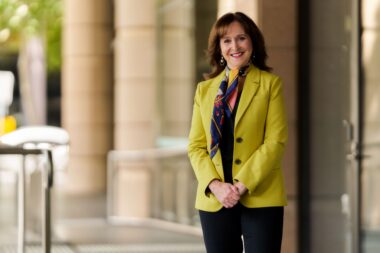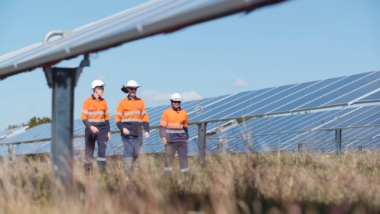The research institute will offer advice to industry on how to assess and respond to climate change.
Experts and industry leaders in the field of climate change gathered last night for the launch of the UNSW Institute for Climate Risk & Response (ICRR). The new institute will support the activities of UNSW researchers from the faculties of Science, Business and Law & Justice.
“UNSW has a huge amount of expertise and solutions to offer in the fight against climate change. The Institute for Climate Risk & Response will work with business and government to leverage this expertise and provide advice on how to respond to climate risks,” said Professor Ben Newell, the Director of the UNSW ICRR.
UNSW Provost, Scientia Professor Vlado Perkovic said the Institute represents a bold statement by UNSW about its commitment to addressing climate risk and working with industry to do so.
“The research developed by the Institute will help create a new generation of climate literate leaders and managers in industry and government. They will be a generation of leaders who are able to understand and communicate complex climate information into actionable and effective solutions as we seek to mitigate and adapt to climate risks,” Prof. Perkovic said.
The Hon Matt Thistlethwaite MP, Federal Member for Kingsford Smith, Assistant Minister for Defence, Veterans’ Affairs and the Republic said: “The Albanese Government is delivering real climate action, and I’m proud to support the UNSW Institute for Climate Risk & Response here in our community. This aligns with our commitment to not just reduce emissions but also drive our economy forward. We know good climate policy is good for the economy.
“That's why we're investing in cleaner, cheaper energy, which sets up Australian industries for future success. Through support for initiatives like this Institute, we're rolling out landmark reforms that benefit both the environment and industry. It's practical, it's urgent, and it's what Australians expect from us."
In addition to providing advice and support to industry, the Institute will have a research agenda and will provide lifelong-learning and professional education.
“UNSW consulted extensively with business and government in planning the new Institute. It has become clear to us what Industry needs help with to address climate risk, and what UNSW can do to achieve this,” Prof. Newell said.
The three main research areas the Institute will focus on are:
Informing industry practice and policy
The Institute will help business and government interpret climate science, provide guidance on what climate science can be trusted and how to integrate it into their business models.
“We will help explain climate science data and information to industry in a way that can be used to inform industry practice and policy and be communicated to employees, customers and the public,” Prof. Newell said.
“Assisting industry in this way will provide them with confidence about the quality and effectiveness of their planning and decision-making and communications with stakeholders.”
Predicting human behaviour
How human behaviours change in response to climate risks will have enormous implications for how government and business should plan for and manage, among other things, economic activity, and consumer behaviour.
“Behavioural science will be a major focus for the Institute,” Prof. Newell said.
“Linking models of human behaviour with economic and climate models is crucial for improving our projections about what the future holds. Putting behavioural scientists, climate scientists and economists in the room together allows us to tackle this challenge in innovative ways that can drive solutions for business and government.”
Another ICRR project examines what consumers think about climate risks related to real-estate purchases. Pilot experimental work is assessing people’s willingness to pay where properties are more susceptible or prone to climate related perils. These results will help inform best-practice for communicating risk-related information to consumers.
Meeting regulatory standards regarding climate change
The Institute will assist industry in navigating and implementing regulations and standards – both local and international – pertaining to climate risk. It will advise on measuring and evaluating their effectiveness with confidence.
The ICRR will assist industry by providing applied research that points to best practice and policy, and by establishing educational programs and advice that better upskill and prepare industry.
The Institute is already in discussion with accounting and other professional bodies to develop educational offerings for professional training and accreditation.
Other work is focussing on identifying and understanding the legal risks attached to climate change by linking it to matters such as class action, and climate litigation.
“Climate change is not a problem for the future, it is happening now. The new Institute is dedicated to helping industry and government act fast as we face the risks and seize the opportunities of our changing world,” Prof. Newell said.
Contact details:
Yolande Hutchinson
Ph: 0420 845 023



